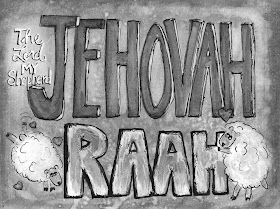Meaning and Derivation: Jehovah is translated as "The
Existing One" or "Lord." The chief meaning of Jehovah is derived
from the Hebrew word Havah meaning "to be" or "to exist."
It also suggests "to become" or specifically "to become
known" - this denotes a God who reveals Himself unceasingly. Tsedek
(tseh'-dek), from which Tsidkenu derived, means "to be stiff,"
"to be straight," or "righteous" in Hebrew. When the two
words are combined - Jehovah Tsidkenu - it can be translated as "The Lord
Who is our Righteousness." [BlueLetterBible]
In his days Judah shall be saved, and Israel shall dwell safely: and
this is his name whereby he shall be called, THE LORD OUR RIGHTEOUSNESS.
Jeremiah 23:6
Jeremiah 23:6
In those days shall Judah be saved, and Jerusalem shall dwell safely:
and this is the name wherewith she shall be called, The LORD our righteousness.
Jeremiah 33:16
Jeremiah 33:16
If you have a moment or ten to read, I suggest checking out this sermon from Charles Surgeon
from 1851 in reference to this specific name of God.
The below was taken from Brandon
Web.
When Jeremiah spoke this prophecy (Jeremiah
23:5-6), the kingdom of Judah was about to fall. The land of Judah was full
of idolatry, oppression, violence, and political revolution. The Northern
kingdom of Israel had gone into captivity 100 years before and Judah seemingly
learned nothing from God's judgment upon them. It was under these conditions
God gave this prophecy of Jehovah-Tsidkenu.
I. The Meaning Of The
Word "Tsidkenu"
A. The word "Tsidkenu" is derived from
"Tsedek" and means "righteousness."
B. "Tsedek" is translated hundreds of times as:
right, righteous, righteousness, just, justify, declare innocent.
C. A simple definition of righteousness is 'doing that which
is right'.
D. This name speaks of the fact that God will always do that
which is right…because He is righteous!
(Exodus 9:27) And Pharaoh sent, and called for Moses and
Aaron, and said unto them, I have sinned this time: the LORD is righteous, and
I and my people are wicked.
(Psalms 129:4) The LORD is righteous: he hath cut asunder
the cords of the wicked.
II. Jehovah is the
Source of Righteousness
A. Jehovah is Himself perfect righteousness. (Deuteronomy
32:4) He is the Rock, his work is perfect: for all his ways are judgment: a God
of truth and without iniquity, just and right is he.
(Isaiah 45:21) Tell ye, and bring them near; yea, let them
take counsel together: who hath declared this from ancient time? who hath told
it from that time? have not I the LORD? and there is no God else beside me; a
just God and a Saviour; there is none beside me.
B. Man has no righteousness
(Romans 3:10) As it is written, There is none righteous, no,
not one:
(Isaiah 64:6) But we are all as an unclean thing, and all
our righteousnesses are as filthy rags; and we all do fade as a leaf; and our
iniquities, like the wind, have taken us away.
C. The Bible makes it clear that righteousness is impossible
to be attained by man alone.
(Psalms 51:5) Behold, I was shapen in iniquity; and in sin
did my mother conceive me.
(Job 25:4) How then can man be justified with God? or how
can he be clean that is born of a woman?
D. Since we are unrighteous, we need pardon from God.
(Isaiah 61:10) I will greatly rejoice in the LORD, my soul
shall be joyful in my God; for he hath clothed me with the garments of
salvation, he hath covered me with the robe of righteousness, as a bridegroom
decketh himself with ornaments, and as a bride adorneth herself with her
jewels.
III. Jesus Is Our
Jehovah-Tsidkenu
A. Jesus is Himself the Righteous One.
(Hebrews 1:8-9) But unto the Son he saith, Thy throne, O
God, is for ever and ever: a sceptre of righteousness is the sceptre of thy
kingdom. Thou hast loved righteousness, and hated iniquity; therefore God, even
thy God, hath anointed thee with the oil of gladness above thy fellows.
B. Jesus is made righteousness to us.
(1 Corinthians 1:30) But of him are ye in Christ Jesus, who
of God is made unto us wisdom, and righteousness, and sanctification, and
redemption:
(2 Corinthians 5:21) For he hath made him to be sin for us,
who knew no sin; that we might be made the righteousness of God in him.
C. What we could not do Jesus the perfectly righteous one
did for us.
(Romans 10:4) For Christ is the end of the law for
righteousness to every one that believeth.
(Romans 5:19) For as by one man's disobedience many were
made sinners, so by the obedience of one shall many be made righteous.
D. Man tries to establish his own righteousness which cannot
be done.
(Romans 10:3) For they being ignorant of God's righteousness,
and going about to establish their own righteousness, have not submitted
themselves unto the righteousness of God.
E. Our new man is created by Jehovah-Jesus in righteousness.
(Ephesians 4:24) And that ye put on the new man, which after
God is created in righteousness and true holiness.
(Romans 3:26) To declare, I say, at this time his
righteousness: that he might be just, and the justifier of him which believeth
in Jesus.
What a wonderful name that God has used to describe Himself
tonight. He is Jehovah-Tsidkenu. The Righteous God who has provided for our
acceptance before Himself through the cleansing of the blood of the Lamb. He
wraps us in His righteousness through Jesus Christ the Righteous One!
---------








